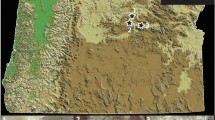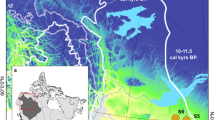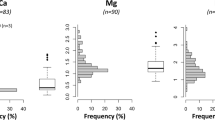Abstract
THE turn-over of soil organic matter is a much-discussed problem in pedology. Although much has been written about the rate of breakdown of soil organic matter in mull and mor (for references see ref. l), our knowledge of the turn-over of forest soil humus is very incomplete. This is particularly true of the organic matter in soil horizons below the humus layer.
This is a preview of subscription content, access via your institution
Access options
Subscribe to this journal
Receive 51 print issues and online access
$199.00 per year
only $3.90 per issue
Buy this article
- Purchase on Springer Link
- Instant access to full article PDF
Prices may be subject to local taxes which are calculated during checkout
Similar content being viewed by others
References
Handley, W. R. C., Forestry Comm. Bull., No. 23, 1 (London, 1954).
Östlund, H. G., Arkiv Kemi, 12, No. 6, 69 (1957); see p. 74.
De Vries, H. L., Proc. K. Ned. Akad. Wetensch., B, 61, 94 (1958).
Author information
Authors and Affiliations
Rights and permissions
About this article
Cite this article
TAMM, C., ÖSTLUND, H. Radiocarbon Dating of Soil Humus. Nature 185, 706–707 (1960). https://doi.org/10.1038/185706b0
Issue Date:
DOI: https://doi.org/10.1038/185706b0
This article is cited by
-
Contrasting effects of increased carbon input on boreal SOM decomposition with and without presence of living root system of Pinus sylvestris L.
Plant and Soil (2014)
-
Age of the Youngest Hydrated Halloysite of Kyushu
Nature (1966)
-
Dating of Humus Podzols By Residual Radiocarbon Activity
Nature (1964)
Comments
By submitting a comment you agree to abide by our Terms and Community Guidelines. If you find something abusive or that does not comply with our terms or guidelines please flag it as inappropriate.



